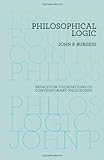Philosophical Logic / John P. Burgess.
Material type: TextSeries: Princeton Foundations of Contemporary Philosophy ; 1Publisher: Princeton, NJ : Princeton University Press, [2009]Copyright date: ©2009Edition: Course BookDescription: 1 online resource (168 p.)Content type:
TextSeries: Princeton Foundations of Contemporary Philosophy ; 1Publisher: Princeton, NJ : Princeton University Press, [2009]Copyright date: ©2009Edition: Course BookDescription: 1 online resource (168 p.)Content type: - 9780691137896
- 9781400830497
- 160
- BC108 .B889 2012
- online - DeGruyter
- Issued also in print.
| Item type | Current library | Call number | URL | Status | Notes | Barcode | |
|---|---|---|---|---|---|---|---|
 eBook
eBook
|
Biblioteca "Angelicum" Pont. Univ. S.Tommaso d'Aquino Nuvola online | online - DeGruyter (Browse shelf(Opens below)) | Online access | Not for loan (Accesso limitato) | Accesso per gli utenti autorizzati / Access for authorized users | (dgr)9781400830497 |
Browsing Biblioteca "Angelicum" Pont. Univ. S.Tommaso d'Aquino shelves, Shelving location: Nuvola online Close shelf browser (Hides shelf browser)

|

|

|

|

|

|

|
||
| online - DeGruyter Boundaries of Contagion : How Ethnic Politics Have Shaped Government Responses to AIDS / | online - DeGruyter Hearing and Knowing Music : The Unpublished Essays of Edward T. Cone / | online - DeGruyter The Message Matters : The Economy and Presidential Campaigns / | online - DeGruyter Philosophical Logic / | online - DeGruyter Barriers to Democracy : The Other Side of Social Capital in Palestine and the Arab World / | online - DeGruyter History Man : The Life of R. G. Collingwood / | online - DeGruyter Social Structures / |
Frontmatter -- Contents -- Preface -- Acknowledgments -- Chapter One. Classical Logic -- Chapter Two. Temporal Logic -- Chapter Three. Modal Logic -- Chapter Four. Conditional Logic -- Chapter Five. Relevantistic Logic -- Chapter Six. Intuitionistic Logic -- References -- Index
restricted access online access with authorization star
http://purl.org/coar/access_right/c_16ec
Philosophical Logic is a clear and concise critical survey of nonclassical logics of philosophical interest written by one of the world's leading authorities on the subject. After giving an overview of classical logic, John Burgess introduces five central branches of nonclassical logic (temporal, modal, conditional, relevantistic, and intuitionistic), focusing on the sometimes problematic relationship between formal apparatus and intuitive motivation. Requiring minimal background and arranged to make the more technical material optional, the book offers a choice between an overview and in-depth study, and it balances the philosophical and technical aspects of the subject. The book emphasizes the relationship between models and the traditional goal of logic, the evaluation of arguments, and critically examines apparatus and assumptions that often are taken for granted. Philosophical Logic provides an unusually thorough treatment of conditional logic, unifying probabilistic and model-theoretic approaches. It underscores the variety of approaches that have been taken to relevantistic and related logics, and it stresses the problem of connecting formal systems to the motivating ideas behind intuitionistic mathematics. Each chapter ends with a brief guide to further reading. Philosophical Logic addresses students new to logic, philosophers working in other areas, and specialists in logic, providing both a sophisticated introduction and a new synthesis.
Issued also in print.
Mode of access: Internet via World Wide Web.
In English.
Description based on online resource; title from PDF title page (publisher's Web site, viewed 29. Jul 2021)


